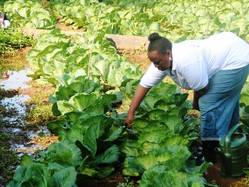Livelihood support rejuvenates the activities of farmers affected by the Ebola outbreak

The declaration of the end of the Ebola epidemic in Sierra Leone brought relief to the government and citizens, after a 72 week-long outbreak that has caused over 3 500 deaths and disrupted economic and livelihood activities.
In order to help cushion the adverse effect of the outbreak on the farming communities in the country, the Africa Solidarity Trust Fund (ASTF) provided timely financing to FAO. Mr. David Mwesigwa, FAO’s Head of Programme Implementation, explains that thanks to these funds, an assessment of randomly sampled Agribusiness Centres (ABCs) was conducted across the country in July 2015 to ascertain the impact of the outbreak on their farming activities, and identify areas and beneficiaries for immediate support.
The Sorbeh Agribusiness Centre, situated in Kabala Town, Koinadugu District, in the North of Sierra Leone, is one of the 16 ABCs selected for support based on actual needs. The ABC is made up of eleven farmer organisations with at least twenty-five members in each group, who are mostly women farmers engaged in vegetable and rice farming. Every year, they supply 10 000 kg of rice to the World Food Programme (WFP) for its school feeding project.
The Chairlady of the Centre, Ms Aminata Bangura, recently visited the FAO Office in Freetown to express gratitude for what she described as a timely assistance: “We were never hopeful of resuming farming activities in 2015. We ate all the seeds we had in our stocks and the revolving funds during the height of the Ebola outbreak, as we were neither working nor engaged in business because of the public emergency regulations” she lamented.
Ms Bangura explained that the support enabled them to buy vegetable seeds of different varieties, fertilizer, insecticides and sprayers. The farmers also received support to continue participating in the village savings and loan association based on the business plans they submitted through their executive committees. “With this assistance, we are very hopeful of a bumper harvest from which we can be able to supply rice to WFP as we used to” she stated.
This is one example of how farmers hardest hit by the Ebola outbreak are being supported by FAO and other partners in Sierra Leone, as part of the recovery interventions in the agriculture sector.
Published: May, 2016
Project: Post-Ebola Agribusiness Sector Recovery in Sierra Leone
